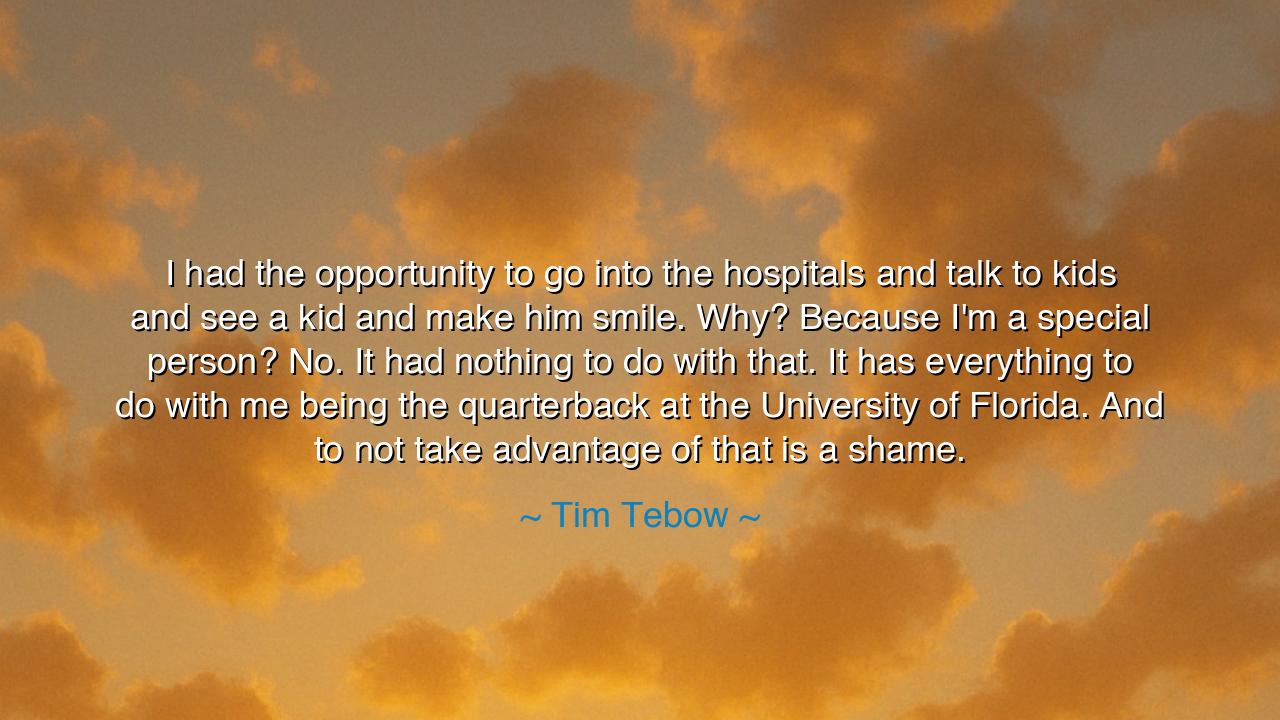
I had the opportunity to go into the hospitals and talk to kids
I had the opportunity to go into the hospitals and talk to kids and see a kid and make him smile. Why? Because I'm a special person? No. It had nothing to do with that. It has everything to do with me being the quarterback at the University of Florida. And to not take advantage of that is a shame.






Hear now the words of Tim Tebow, spoken not in pride but in humility: “I had the opportunity to go into the hospitals and talk to kids and see a kid and make him smile. Why? Because I'm a special person? No. It had nothing to do with that. It has everything to do with me being the quarterback at the University of Florida. And to not take advantage of that is a shame.” These words, simple yet powerful, remind us that influence is a gift, and that to waste such a gift is to turn away from the calling placed upon one’s life.
The origin of this truth lies not in the game of football alone, but in the eternal principle that those entrusted with visibility and power carry a responsibility to use it for the good of others. Tebow speaks as a quarterback, but his words echo the wisdom of prophets and leaders through the ages: the position is not the man, but the position gives the man a chance to serve. He declares that it is not his personal greatness that brings smiles to children in hospitals, but the platform he holds. And in this acknowledgment lies the humility of true strength.
History gives us countless mirrors of this teaching. Consider Marcus Aurelius, Emperor of Rome, who in his meditations confessed that his power was not his own glory but a duty to serve the empire. Or look to Mother Teresa, who bore no crown, yet her position as a nun gave her entrance into the poorest places of Calcutta, where she could cradle the dying. Neither claimed that they were “special” in themselves. Like Tebow, they saw that their role, their title, their opportunity was a vessel—and that to waste such a vessel would be a betrayal of the countless lives it could touch.
Tebow’s words also strike against the temptation of vanity. Many who rise to prominence imagine that the world’s attention is proof of their superiority. But the wise know that fame, honor, and position are like the wind: fleeting, borrowed, never owned. The true test is whether one uses these winds to carry others to safety. When Tebow speaks of visiting a sick child to bring a smile, he shows that the measure of greatness is not in touchdowns or trophies, but in compassion. The glory of the field fades; the memory of a smile endures forever.
This quote also reveals a heroic truth: that to ignore the needs of others when one has the power to help is a form of shame. How many kings, how many leaders, how many celebrated figures in history failed in this way—living only for themselves while the suffering of their people cried out? Contrast them with leaders like Abraham Lincoln, who bore the crushing weight of war not for his own ambition but to preserve a union and set slaves free. The lesson resounds: positions of influence are not shields for comfort, but torches to be lifted in service.
The lesson for us is clear. Each of us, in our own way, has platforms—perhaps not as grand as quarterback of a great university, yet still powerful in the lives of those around us. You may be a parent, a teacher, a neighbor, a friend. These roles grant you influence, however small it may seem. To leave it unused, to walk past those who might need your smile, your word, your hand, is to waste what you have been entrusted with.
Practical wisdom follows: ask yourself each day, What platform has been given to me? It may be a classroom, a workplace, a team, or a family. Then ask, How can I use this today to bring good to another? It need not be grand. A visit, a word of encouragement, a gesture of kindness—these are the victories that outlast fame. Remember that your influence is not for yourself but for others.
Thus the teaching is sealed: positions are borrowed; service is eternal. Whether emperor or quarterback, mother or teacher, each of us is called to lift others with the gifts we are given. Tim Tebow reminds us that the true shame is not in failure, but in neglecting the chance to do good. Therefore, let each of us walk with open eyes, ready hands, and humble hearts—using our place in life, however great or small, to leave behind smiles that will shine long after we are gone.






AAdministratorAdministrator
Welcome, honored guests. Please leave a comment, we will respond soon